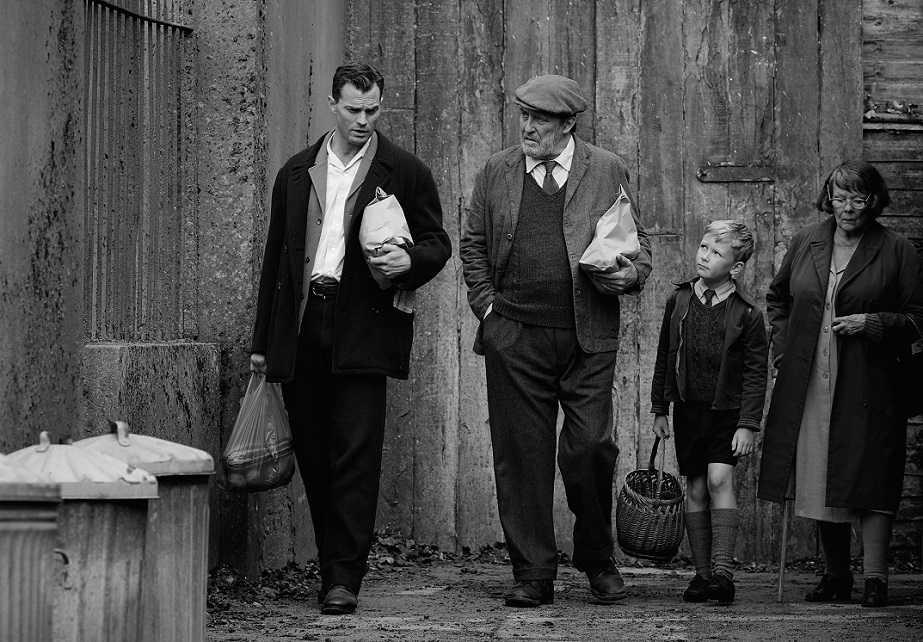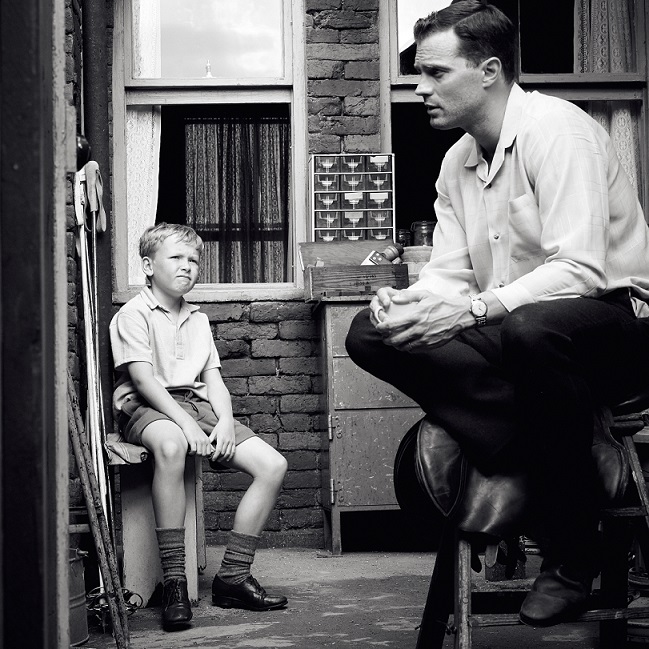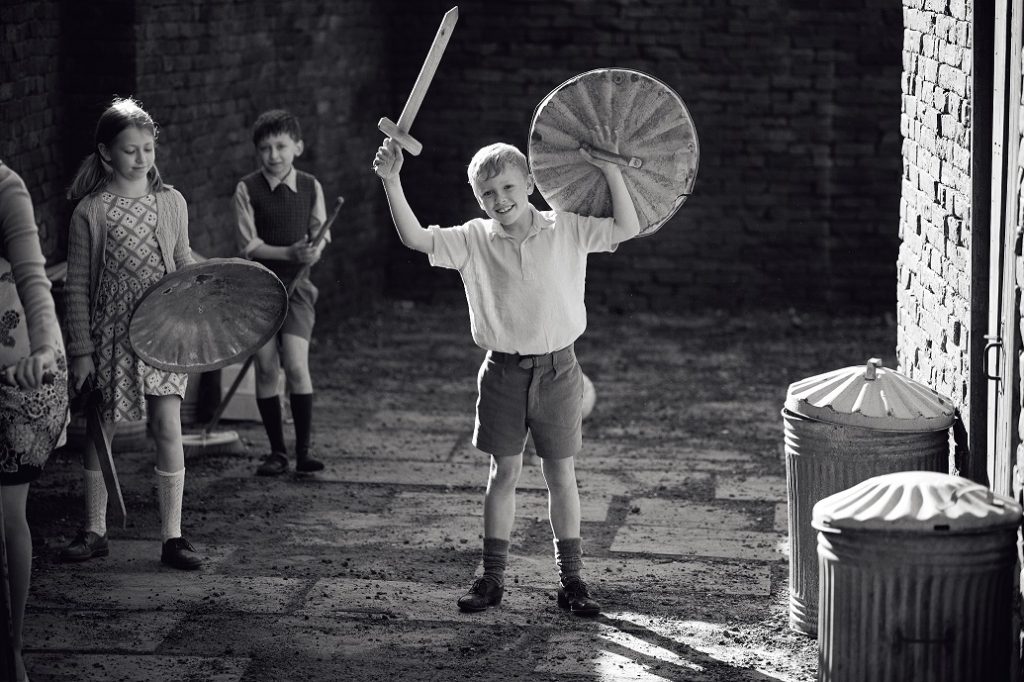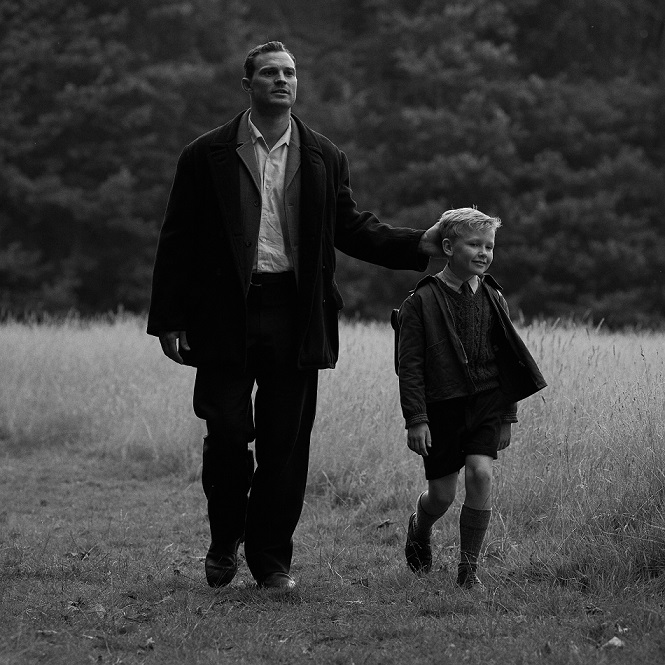Focus Features is releasing Belfast in theaters on November 12th.
According to recent interviews, actor/writer/director Kenneth Branagh has always wanted to make a film about his childhood and growing up In Belfast, Northern Ireland during the turbulent late 1960s. The recent lockdown allowed him to focus on this idea, developing it into Belfast, his latest effort and one of the best features of the year. Everything about this movie, from its observations to the characters themselves, feel genuine and absorbing, as if viewers are getting an authentic look into a child’s life during this period in history.

Buddy (Jude Hill) is a nine-year-old with all the typical interests of a boy his age, including the cinema and comic books. His Pa (Jamie Dornan) works in construction, often away for weeks at a time, leaving him at home with his Ma (Caitriona Balfe), grandfather Pop (Ciarán Hinds) and Granny (Judi Dench). While Buddy deals with relatable and amusing problems associated with growing up, there are bigger dangers in the streets due to civil unrest known as The Troubles. The Protestant family enjoy family life on a street with mostly Catholic residents, but the area becomes a hotspot for violent attacks by those with extremist views about the protagonist’s neighbors. Pa doesn’t see a safe future in Belfast and wants to leave the country, but faces resistance from Buddy and other family members.

This is a film that relies almost entirely on the performance of a child and newcomer Jude Hill does an astounding job. The youth is put through the ringer, displaying a wide range of emotions. This includes wide-eyed youthful exuberance and comical arguments with another kid about which names belong to what religious persuasion, as well as the pangs of having a crush, anxiety at being roped into a petty theft, frustration at the possibility of moving and genuine fear during violent outbreaks. Remarkably, there isn’t a false note anywhere and the kid is charming and relatable from beginning to end. The supporting cast are every bit as strong, with Hinds making a remarkable impression as Pop. This grandfather entertainingly spouts off questionable advice and tries to teach the boy a few nifty tricks.

The overwhelming majority of the film is shot in black and white, with the occasional burst of color during bits when the youngster is seeing a stage show or watching a movie. Despite the gray streets, it’s all gorgeously shot, from the exteriors to the detailed close-ups of the characters. Young performer Hill’s eyes almost pop off the screen and one can see a beautifully weathered expression from the lighting in many of the older family members. There are some impressive overhead angles and lengthy shots that capture chaos occurring in the streets. However, the camera more often seems to be close to the ground and shooting upwards, displaying unique and creative angels in otherwise everyday home environments. This tactic helps the audience empathize with Buddy and see things through his eyes, where the adults and surrounding environments appear larger.
Admittedly, the movie does wear its heart on its sleeve, but even its moral themes are delivered convincingly and effectively by the cast. It doesn’t resort to overt sentimentality. There are no big music swells or melodramatic proclamations between the characters. Yet the film manages to find the perfect tonal balance to make an emotional imprint during its final moments and dedication. Even a hard-hearted reviewer like myself will admit to being so invested in the proceedings that it made me a little misty-eyed.

Frankly, it’s hard to find much to criticize in this picture. For those who want to see a very detailed and convincing picture of a family in Northern Ireland during the late 60s (and more than likely, the life of the movie’s writer and director), there isn’t a false or off note anywhere in this tale. Belfast is a rare feature that is exceptional in just about every department.


